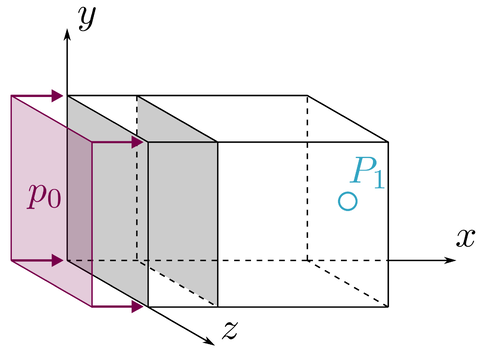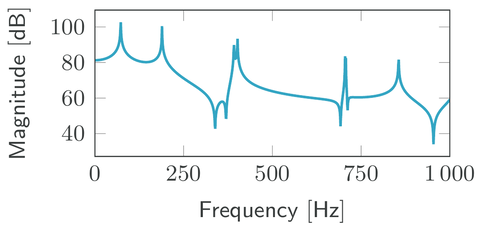m |
m |
||
| Line 80: | Line 80: | ||
==Remarks== |
==Remarks== |
||
| − | * The numerical model resembles the experimental data<ref name="guy81"/> in a frequency range from <math> |
+ | * The numerical model resembles the experimental data<ref name="guy81"/> in a frequency range from <math>1\,\mathrm{Hz}</math> to <math>1000\,\mathrm{Hz}</math>. The frequency response in this range is also included in the dataset. |
* The finite element discretization has been performed with [https://github.com/KratosMultiphysics/Kratos Kratos Multiphysics]. |
* The finite element discretization has been performed with [https://github.com/KratosMultiphysics/Kratos Kratos Multiphysics]. |
||
* The system has unstable eigenvalues. This is common in interior acoustic problems where no damping is assumed for the acoustic fluid<ref name="cool22"/>. |
* The system has unstable eigenvalues. This is common in interior acoustic problems where no damping is assumed for the acoustic fluid<ref name="cool22"/>. |
||
Revision as of 17:07, 5 January 2023
 Note: This page has not been verified by our editors.
Note: This page has not been verified by our editors.
Description
The Sound transmission through a plate benchmark models the radiation of a vibrating plate and the excitation of a structure by an oscillating acoustic fluid. It is based on an experiment by Guy[1].
The system consists of a cuboid acoustic cavity, where one wall is considered a system of two parallel elastic brass plates with a  air gap between them; all other walls are considered rigid. The plates measure
air gap between them; all other walls are considered rigid. The plates measure  and have a thickness of
and have a thickness of  ; the receiving cavity is
; the receiving cavity is  wide. The outer plate is excited by a uniform pressure load and the resulting acoustic pressure in the receiving cavity is measured at the middle of the rigid wall opposite to the elastic plate (
wide. The outer plate is excited by a uniform pressure load and the resulting acoustic pressure in the receiving cavity is measured at the middle of the rigid wall opposite to the elastic plate ( in the sketch).
in the sketch).
The following material parameters have been considered for the brass plates and the acoustic fluid:
| Part | Parameter | Value | Unit |
| Brass plates | 
|

|

|

|

|

| |

|

|

| |
| Acoustic fluid | 
|

|

|

|

|

|
Dimensions
System structure:
System dimensions:
 ,
,
 ,
,
 ,
,
 ,
,
 ,
with
,
with  .
.
Proportional damping, i.e.  , with
, with  is considered.
The two-way coupling between the structure and the acoustic fluid results in non-symmetric matrices
is considered.
The two-way coupling between the structure and the acoustic fluid results in non-symmetric matrices  .
.
Data
The data is available at Zenodo.
Remarks
- The numerical model resembles the experimental data[1] in a frequency range from
 to
to  . The frequency response in this range is also included in the dataset.
. The frequency response in this range is also included in the dataset. - The finite element discretization has been performed with Kratos Multiphysics.
- The system has unstable eigenvalues. This is common in interior acoustic problems where no damping is assumed for the acoustic fluid[2].
- A comparison of different interpolation-based MOR methods using this benchmark example is available in[3]
Citation
To cite this benchmark, use the following references:
- For the benchmark itself and its data:
@Misc{dataAum22,
author = {Aumann, Q.},
title = {Matrices for a sound transmission problem},
howpublished = {hosted at {MORwiki} -- Model Order Reduction Wiki},
year = 2022,
doi = {10.5281/zenodo.7300347}
}
- For the background on the benchmark:
@Article{AumW23,
author = {Aumann, Q. and Werner, S.~W.~R.},
title = {Structured model order reduction for vibro-acoustic problems using interpolation and balancing methods},
journal = {Journal of Sound and Vibration},
volume = 543,
year = 2023,
pages = {117363},
doi = {10.1016/j.jsv.2022.117363},
publisher = {Elsevier {BV}}
}
References
- ↑ 1.0 1.1 R. W. Guy. "The Transmission of Airborne Sound through a Finite Panel, Air Gap, Panel and Cavity Configuration – a Steady State Analysis ", Acta Acustica united with Acustica, 49(4): 323--333, 1981.
- ↑ V. Cool, S. Jonckheere, E. Deckers, W. Desmet. "Black box stability preserving reduction techniques in the Loewner framework for the efficient time domain simulation of dynamical systems with damping treatments", Journal of Sound and Vibration, 529: 116922, 2022.
- ↑ Q. Aumann, S. W. R. Werner. "Structured model order reduction for vibro-acoustic problems using interpolation and balancing methods", Journal of Sound and Vibration, 543: 117363, 2023.



